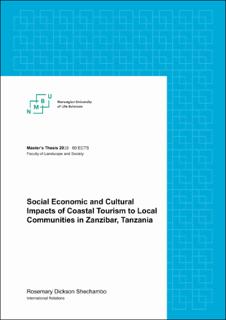| dc.contributor.advisor | Bryceson, Ian | |
| dc.contributor.author | Shechambo, Rosemary Dickson | |
| dc.coverage.spatial | Tanzania, Zanzibar | en_US |
| dc.date.accessioned | 2020-02-18T14:29:20Z | |
| dc.date.available | 2020-02-18T14:29:20Z | |
| dc.date.issued | 2019 | |
| dc.identifier.uri | https://hdl.handle.net/11250/2642381 | |
| dc.description.abstract | This study intends to examine socio economic and cultural impact of coastal tourism on local people. The study was carried out in Nungwi and Paje village located in Unguja Island Zanzibar. The study used mixed research methods including survey questionnaires, focus group discussions, semi-structure interviews and direct observations. All these were carried out to grasp important information required for addressing the research objectives and questions.
The study used two theoretical approaches for examining the impact of tourism activities to the local people. Integrated coastal management approach was used to assess the conflicts over resources use between local people and other tourism stakeholders including investors. The Sustainable livelihood approach was used to examine the resilience of local people from development of tourism activities in terms of security, recognition and participation in tourism development. The combined approach was useful to allow local people to cope with the changes brought as results of the development of the tourism sector and allow them to participate in the tourism development while minimizing the negative impacts associated with tourism activities.
Findings from this study show that tourism in the main economic activities in both Paje and Nungwi villages. However, tourism activities were observed to have some effects to the local people and their society in general. It was observed that, the increase of social change, pollution, drugs and alcohol, conflict over resources use and high rate of immigrants in the villages were the main challenges impacting the local people hence hindering their participation in the tourism industry. Low education and poor awareness among the local community members were also observed to hinder local people participation in tourism businesses. As results most of the businesses and job opportunities related to tourism are taken by foreigners and immigrants.
Although tourism industry is a fast-growing sector but some tourism activities tend to have some negative impacts to the communities and the environment. The participation of local people in tourism activities is important for reducing their vulnerabilities. Investors should maintain good relationships with the adjacent local communities to ensure sustainability of the tourism activities in the villages. It is important to mainstream coastal tourism issues in the education system, ensure participatory formulation of tourism policies, increase scholarships for training local people, facilitate village natural resource committees and invest in the tourism for all campaign. | en_US |
| dc.language.iso | eng | en_US |
| dc.publisher | Norwegian University of Life Sciences, Ås | en_US |
| dc.rights | Attribution-NonCommercial-NoDerivatives 4.0 Internasjonal | * |
| dc.rights.uri | http://creativecommons.org/licenses/by-nc-nd/4.0/deed.no | * |
| dc.subject | Participation | en_US |
| dc.subject | Sex tourism | en_US |
| dc.title | Social economic and cultural impacts of coastal tourism to local communities in Zanzibar, Tanzania | en_US |
| dc.type | Master thesis | en_US |
| dc.description.version | submittedVersion | en_US |
| dc.subject.nsi | International Relations | en_US |
| dc.source.pagenumber | 103 | en_US |
| dc.description.localcode | M-IR | en_US |

